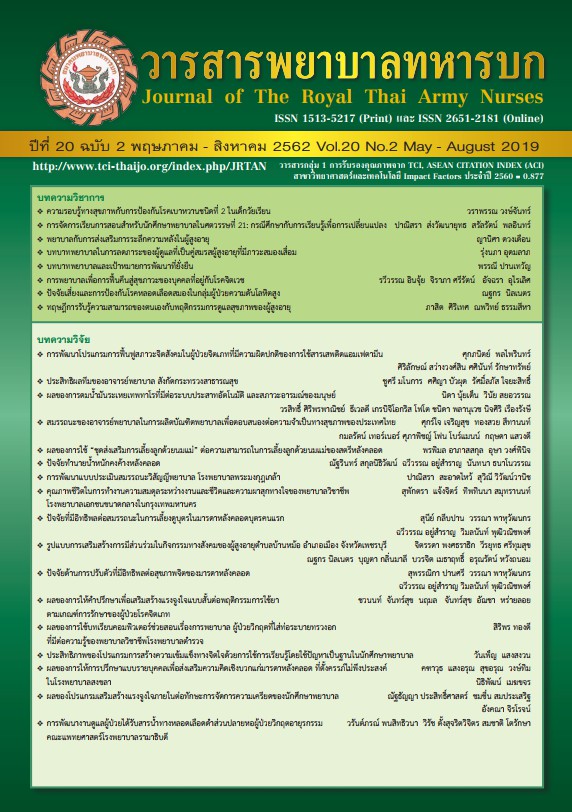Psychosocial Rehabilitation Program Development for Schizophrenia Patients with an Amphetamine Use Disorder
Keywords:
Program Development, Psychosocial Rehabilitation, SchizophreniaPatients with an Amphetamine Use DisorderAbstract
The purpose of this research was to study the development of a psychosocial rehabilitation program for patients withSchizophrenia and an amphetamine use disorder, and then to study the results using quasi-experimental designs. Five steps were utilized to develop the program: 1)analysis of the problems; 2) planning; 3) prototype; 4) test and improve the program; and 5) a training program. The program had design as a series of eightactivities that were compared using a pretest–posttest experiment. The dependent variables were social functioning, quality of life, re-admit and a return to using drugs; which was tested using twenty person samples. The measuring instruments were social functioning assessment, quality of life assessment, along with follow-up after treatment. The results showed that the two groups’ quality of life and social functioning score increased immediately after treatment, and also after one and three months of treatment. However, the social functioning score of the experimental group was higher than the control group’s score. In addition, after threemonths the experimental group’s numbers for not returning to drug use was higher than those for the control group. Moreover, the control group’s return for inpatient treatment was significantly higher; at a statistical level of .05
Downloads
References
2. Gottlieb JD, Mueser KT, GlynnSM. Family therapy for schizophrenia: Cooccurring psychotic and substance use disorders. J Clin Psychol. 2012;68:490-501
3. Maneeganol S. Arunponpaisal S., Pimpanit V., Jarassaeng N., Boontoch K. Prevalence of Substance Use in Psychiatric Outpatient Clinic at Srinagarind Hospital. J Psychiatr Assoc Thailand. 2014; 59:371-80 (in Thai)
4. Princess Mother National Institute on Drug Abuse Treatment. Patient Databased: Drugs dependence patient’s information during 2016-2018. Pathumthani: Princess Mother National Institute on Drug Abuse Treatment; 2018.
5. Planning and information department. Annual report 2017. Nontaburi: Srithanya hospital; 2017.
6. Planning and information department. Annual report 2018. Nontaburi: Srithanya hospital; 2018.
7. Scott JC, Woods SP, Matt GE, Meyer RA, Heaton RK, AtkinsonJH, et al. Neurocognitive effects of methampheta mine: A critical review and meta-analysis. Neuropsychol Rev. 2007; 17:275-97
8. Green AI, Drake RE, Brunette MF, Noordsy DL. Schizophrenia and cooccurring substance use disorder Am J Psychiatry. 2007;164:402-8
9. Compton MT, Weiss PS, West JC, Kaslow NJ. The associations between substance use disorders, schizophreniaspectrum disorders, and Axis IVpsychosocial problems. Soc Psychiatry PsychiatrEpidemiol. 2005;40:939-46
10. Linstrom E, Bingefors K. Patient compliance with drug therapy inSchizophrenia. Phamacoeconomics. 2000;18:105-24
11. Birchwood M, Smith J, Cochrane R, Wetton S, Copestake S. The Social Functioning Scale the Development and Validation of a New Scale of Social Adjustment for use in Family Intervention Programmes with Schizophrenic Patients.The British Journal of Psychiatry. 1990; 157:853-59
12. Luprasong S., Thanee S., Saithanu K., Choomuang K. Quality of Life of Psychiatric Patients and Their Caregiversin Ubonratchathani Province. Bulletin of Suanprung. 2017;33:175-88(in Thai)
13. Ek-umaImkome. Psychosocial Intervention among drug-abusing schizophrenia patients evidence based.Journal of Science and Technology. 2013;21(7)sup:697-710 (in Thai)
14. Srithanya hospital. Guideline of Psychaitric Rehabilitation for public personel’ s Recovery orientation. Nonthaburi: Department of Mental Health Ministry of Public Health; 2016.
15. Uys LR. A Theoretical Framework For Psychiatric Rehabilitation .Curationis 1991;14(3):a 329
16. Werakieart S., Nanakorn B., Chaichumni N. The Development of a Buddhist-Based Mutual Support Program for Schizophrenic Patients with Substance Use Songklanagarind. Journal of Nursing.2015;35:85-100 (in Thai)
17. Athan P. The effects of a psychosocial rehabilitation program on quality of life of addicts [dissertation]. Bangkok: Thammasat University; 2015
18. Tinpairoj J., Hirunviwatgul N. The effect of Matrix Program on Quality of Life of addict patients at Phramongkutklao hospital.Royal Thai Army Medical Journal. 2018;71:3-10 (in Thai)
19. Komkham T., Kornkertchok R. The effect of psychoeducation program focusing or skill training on social functioning of schizophrenic patients in community. The journal of psychiatric nursing and mental health. 2013; 27:101-12 (in Thai)
20. Petcharat B, Suwaluk Y.Factors related to caregivers’ caring behaviors for chronic schizophrenic patients at home. Songklanagarind Medical Journal. 2003;21:249-58 (in Thai)
21. Zeldman A, Richard MR, Kevin F. Motivation, autonomy support, and entity beliefs: Their role in methadone maintenance treatment. Journal of Social and Clinical Psychology. 2004;23: 675-96
22. Tomey AM. Learning with case.The Journal of Continuing Education in Nursing. 2003;34: 34-8
23. Phuttharod P. Development of a Continuing Care Model to reduce recurrence in Schizophrenia patient.Journal of Health Science. 2018;27: 478-86 (in Thai)
Downloads
Published
How to Cite
Issue
Section
License
บทความหรือข้อคิดเห็นใดใดที่ปรากฏในวารสารพยาบาลทหารบกเป็นวรรณกรรมของผู้เขียน ซึ่งบรรณาธิการหรือสมาคมพยาบาลทหารบก ไม่จำเป็นต้องเห็นด้วย
บทความที่ได้รับการตีพิมพ์เป็นลิขสิทธิ์ของวารสารพยาบาลทหารบก
The ideas and opinions expressed in the Journal of The Royal Thai Army Nurses are those of the authors and not necessarily those
of the editor or Royal Thai Army Nurses Association.






